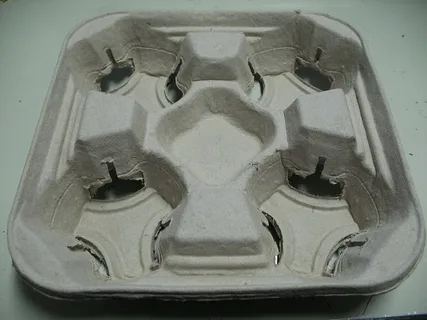In the ever-evolving world of packaging, sustainability and innovation have taken center stage. Among the various eco-friendly materials available, molded pulp has emerged as a standout option. With its versatility, biodegradable nature, and cost-effectiveness, molded pulp packaging is becoming a preferred choice for businesses seeking to minimize their environmental footprint while enhancing product protection. This article explores the unique molded pulp attributes that make it an ideal solution for innovative packaging applications.
The Sustainability Factor: Eco-friendly and Biodegradable
Molded pulp packaging has quickly gained recognition for its sustainable qualities. As environmental concerns continue to rise, businesses are increasingly seeking eco-friendly alternatives to plastic packaging. Molded pulp, primarily made from recycled paper products, is a highly sustainable material. It is fully biodegradable, meaning it will decompose naturally over time without leaving harmful residues behind. Unlike plastic, which can take hundreds of years to break down, molded pulp packaging has a significantly lower environmental impact.
Additionally, the production of molded pulp requires fewer resources and less energy compared to other packaging materials like plastic or Styrofoam. The fibers used in molded pulp come from renewable sources, such as paper and cardboard, making it an excellent option for companies aiming to reduce their dependence on non-renewable resources. By opting for molded pulp packaging, businesses not only meet the growing consumer demand for environmentally responsible products but also contribute to the global effort to combat climate change.
Versatility in Design and Functionality
One of the most notable molded pulp attributes is its remarkable versatility. Molded pulp can be easily shaped into a variety of forms, ranging from simple trays to more complex packaging designs. Whether it’s for protective packaging, product displays, or retail-ready containers, molded pulp can be molded into virtually any shape required. This flexibility makes it ideal for a wide range of industries, from food and beverage packaging to electronics and cosmetics.
Moreover, molded pulp is highly customizable in terms of its design features. Manufacturers can create intricate textures, patterns, and even logos directly on the surface of the pulp, providing both functional and aesthetic benefits. The material can be designed to protect fragile products by incorporating air pockets or cushioning elements, offering superior protection compared to traditional packaging solutions. This adaptability, combined with its eco-friendly nature, makes molded pulp a top choice for businesses seeking innovative and customized packaging solutions.
Cost-Effectiveness and Efficiency
In addition to its environmental benefits and design flexibility, molded pulp also stands out for its cost-effectiveness. The production process of molded pulp is generally more affordable than that of plastic or other packaging materials, making it an attractive option for companies looking to reduce packaging costs. The raw materials used in molded pulp production, primarily recycled paper, are inexpensive and widely available, further driving down the overall cost of production.
Furthermore, molded pulp is lightweight, which can lead to significant savings in transportation and shipping. As companies look for ways to cut costs while reducing their carbon footprint, the lightweight nature of molded pulp packaging provides a dual benefit. The material is easier to handle and transport, reducing the environmental impact associated with shipping while also lowering logistics costs for businesses. This combination of cost savings and sustainability makes molded pulp an efficient solution for a variety of industries, from small startups to large corporations.
Protection and Durability for Sensitive Products
Another key molded pulp attribute is its superior protective capabilities. The inherent structure of molded pulp provides natural shock absorption, making it an ideal material for packaging fragile or sensitive products. Whether it’s electronics, glassware, or perishable goods, molded pulp offers robust protection during shipping and handling. The material’s ability to cushion and absorb impacts helps prevent damage, ensuring products arrive at their destination in excellent condition.
The durability of molded pulp also makes it suitable for long-term storage. Unlike some biodegradable materials that may degrade over time, molded pulp remains stable and protective throughout its lifespan. This attribute is particularly important for industries that rely on packaging for both protection and display purposes, such as the food, beauty, and electronics sectors. The strength and resilience of molded pulp allow it to effectively safeguard products against environmental factors like moisture, dust, and temperature fluctuations, further enhancing its appeal as a packaging solution.
Consumer Appeal and Brand Image Enhancement
In today’s competitive marketplace, consumer preferences are shifting towards brands that prioritize sustainability and environmental responsibility. Molded pulp packaging offers a unique opportunity for businesses to enhance their brand image by aligning with these values. The use of biodegradable and recyclable materials sends a strong message to consumers that a company is committed to reducing its environmental impact.
Moreover, the natural appearance of molded pulp packaging gives it an organic and eco-friendly look, which can appeal to consumers who prioritize sustainability in their purchasing decisions. By choosing molded pulp packaging, companies not only contribute to environmental conservation but also create a positive image that resonates with eco-conscious consumers. This branding advantage can lead to increased customer loyalty and a competitive edge in the marketplace. As sustainability continues to play a key role in consumer decision-making, molded pulp presents an innovative solution that aligns perfectly with evolving consumer expectations.
Conclusion
Molded pulp packaging has rapidly emerged as an innovative and sustainable solution for modern packaging challenges. With its biodegradable nature, versatility in design, cost-effectiveness, protective qualities, and appeal to environmentally-conscious consumers, it offers a comprehensive range of benefits that make it an attractive choice for businesses across various industries. As the demand for eco-friendly packaging grows, molded pulp attributes will continue to play a significant role in shaping the future of packaging solutions. Companies that embrace this material not only benefit from its numerous advantages but also contribute to a more sustainable and responsible future.








